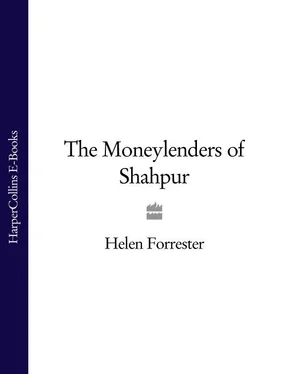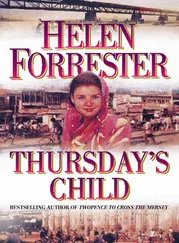It was said that Mahadev’s father was ailing and his uncle was very old, so it would not be long before Mahadev became the head of his communal family. Further, in less than twelve months Dean Mehta would himself retire, and he dearly wished to give himself to a life of contemplation – to become a monk; he had for some years been quietly directing his life towards this goal by study, fasting, confession and the taking of those vows permitted to a layman. To have Anasuyabehn settled now might mean that he would see a grandchild before he severed all earthly relationships by taking his final vows.
He re-opened his book and composed his mind again for work.
‘We’ll see what Anasuyabehn has to say,’ he decided.
Aunt, meanwhile, had sat in a corner of the kitchen and helped to prepare vegetables, while she considered what to say to Anasuyabehn.
The kitchen was quite modern. It had a water tap and beneath it, on the floor, had been built a low, stone enclosure to confine the splashes from it and guide spilled water down the open drain. The walls were whitewashed and, on a built-in shelf, glittered the brass cooking utensils. A watercooler reposed on a stand in a corner near the casement window, and huge double doors, which led on to a veranda, stood open to let in the morning freshness before the real heat of the day began.
‘Take the new box of charcoal outside,’ Anasuyabehn said to her little servant, ‘and brush it.’
The boy picked up a small handbrush and the box and obediently went out into the compound, where he could be heard happily talking to a squirrel, as he gently went over each piece of charcoal with the brush to make sure that no insect was accidentally burned when the fire was lit.
Aunt seized the opportunity to say, ‘I saw Mahadev Desai this morning.’
‘He’s been away a long time,’ said Anasuyabehn. ‘I don’t suppose many people will be glad to see him. He drives even harder bargains than his elders, I’m told.’
She was sitting idly on her kitchen stool waiting for the boy to come in with the charcoal. A neat pile of prepared vegetables, flanked by a tin of cooking fat and her spice box lay on the well-scrubbed floor beside her. The empty charcoal stove was out on the veranda and soon the servant would light a cooking fire in it and bring it to her, carrying it gingerly with long pincers so that he did not get burned.
‘Tut,’ said Aunt. ‘You listen to too much gossip.’
Who’s talking? thought Anasuyabehn grimly.
‘He’s concerned mainly with the jewellery side now – opened a shop in a place near England.’ As she snipped away at the vegetables, she tried to think of aspects of Mahadev which might appeal to a young woman, and added, ‘He had a Western suit on this morning. I saw him driving through the cantonment, when I was on the bus – on my way to Mrs Patel’s.’
‘Did he?’ murmured Anasuyabehn politely, and thought absently that she must buy some more glass bracelets next time a bracelet seller came round.
Aunt had no intention of discussing matrimony with Anasuyabehn, but she did want to obtain from her some words of approbation in respect of the Desais, which she could carefully misinterpret as assent to a proposal. Mistress of domestic intrigue, dedicated matchmaker, she had no intention of giving Anasuyabehn the opportunity of refusal, and she was certain that a man with the taint of moneylending about him would be refused. She, therefore, said no more that day, but during the weeks that followed Anasuyabehn was regaled with quite a number of stories of the nobility and kindness of Mahadev Desai.
Anasuyabehn should undoubtedly have realized what was in her aunt’s mind, but she was entirely absorbed by ideas of marriage elsewhere. The memory of the beautiful, intense features of Dr Tilak staring up at her, as he walked past her home with Dr Bennett, had occupied her thoughts recently, and she only half listened to her aunt’s chatter.
Aunt, meanwhile, luxuriated in the thought of bringing off such a superb alliance in spite of the difficulties of Anasuyabehn’s advanced age and partly Christian education. If only her sons had lived, she thought sadly, how much more interesting life would have been to someone as skilled in matchmaking as herself; there would have been grandsons and granddaughters to marry off. Why the cholera should strike at her sons and leave her daughters was beyond her; and what trying daughters she had – always complaining because they had been married off to brothers who lived in Bombay, so far away from Shahpur. They were lucky, she thought bitterly – at least they ate twice a day, which was more than she had done in the first days of her marriage.
How good her brother had been, she reflected, to give her a home. Anasuyabehn, too, was a charming, respectful girl; Aunt would enjoy taking an interest in her children, though, of course, she would not see very much of them – once a girl was married she belonged to her husband’s family, not to her father’s family.
First, however, Anasuyabehn must have a husband.
If I can get my brother so enmeshed in marriage arrangements that it would be difficult for him to retreat with dignity, he also will press Anasuyabehn towards the marriage. And I must prepare Anasuyabehn, so that at least she does not immediately object when the offer comes.
Lucky women went to and fro between the parents’ houses, and it was curious how, every time a visitor was expected at the Mehta house, Aunt thought of something which was required from town, and Anasuyabehn and her boy servant were dispatched to purchase it, whilst the horoscopes of the proposed bride and groom were discussed and compared.
Anasuyabehn was not a gossip; she had no reason to suspect anything. Even Savitri, her best friend, who might have told her, knew no one else amongst the Jain community and, busy with her work as a chemist in a cotton mill, heard nothing.
Skilfully the old lady spun threads of praise and flattery between the unsuspecting fathers – the wily old moneylender, who was busy trying to rid his family of most of the taint of moneylending and to gain instead a reputation as a jeweller and financier of integrity, and the absent-minded scholar, who, having inspected and spoken to Mahadev, liked him very much. There were times, not so long since, thought Dean Mehta ironically, when neither of them would have dreamed of speaking to the other, but many things were permissible nowadays – the walls between the castes were crumbling down, and Dean Mehta was quite prepared to give them a helping push.
Once Dean Mehta asked his sister, ‘Is Anasuyabehn content about this marriage?’
‘Oh, she has all the foolish ideas of a young girl – but she will appreciate a good man. She agrees that the family in this generation is becoming a most worthy one – and she has been most interested in my stories of Mahadev.’
‘Ah,’ said her brother, a little relieved. ‘I’m content, as long as she has no antipathy to the match.’
‘None at all, none at all,’ said Aunt, with considerably more conviction than she really had. She hoped fervently that all her propaganda directed towards her unsuspecting niece was having sufficient effect to ensure an affirmative answer when the time came.
As she became further committed, the horrid thought of how other women of the family would snigger behind their hands at her, if she failed, began to haunt her – they might even suggest that she was, with advancing years, losing her skill, and that would be hard to bear. She put these thoughts firmly behind her; dear Anasuyabehn should have a wonderful marriage – and all through her aunt’s sagacity.
The day on which Mahadev would make a formal visit to his prospective bride’s family drew near. Unfortunately, his aunt had to return to Baroda to nurse a sick son, so it was understood that Mahadev would be accompanied by his brother and sister-in-law.
Читать дальше












